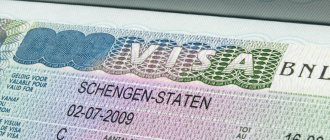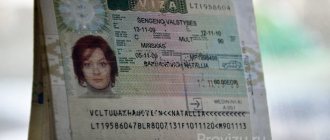Conditions
To begin with, a foreigner who dreams of moving to this country on the Adriatic coast needs to apply for a Schengen visa, preferably category D. Then, having decided on the goals for filing the application, the procedure for obtaining a temporary permit should begin.
A residence permit in Croatia is worth obtaining for those citizens who need to stay there for more than three months. It is issued for a year and, in the absence of grounds for its cancellation, can also be extended for the same period.
You can be absent from the country for no more than ten months a year for a total of five years or up to six months per trip.
A residence permit is issued only to those citizens who meet the following requirements:
- having sufficient funds for a decent living;
- those who have taken out health insurance;
- those who bought or rented housing;
- not posing a threat to the national security of the country;
- not having a ban on entry into the state.
All foreigners who have received a residence permit are required to comply with the decisions and regulations of government bodies.
If the following conditions occur, the residence permit is considered terminated:
- if within a month after receiving it the citizen has not reported his whereabouts to the local police department;
- the person left the country for more than 30 days;
- the purpose of residence is not met;
- The original temporary permit expired and was not renewed.
Permanent residence permit (permanent residence permit) is the next step to obtain citizenship and is issued to the following categories of immigrants:
- after five years - with a residence permit or work permit;
- for three years - having a residence permit for residence and work, married to citizens or holders of permanent residence permit of Croatia;
- minor children of persons with the right of residence.
After five years of permanent residence in the country, it is possible to obtain citizenship if you have a good knowledge of the Constitution, the Croatian language and the ability to write in Latin. In this case, you will have to renounce your previous citizenship.
Who can apply
The grounds for obtaining a Croatian residence permit are:
| Family reunification | The document will be issued if one of the foreigner’s family members has permanent residence, a residence permit for more than two years, or a residence permit issued for the purpose of conducting research activities, as well as providing political asylum. Family members include minor children, brothers and sisters, parents |
| Marriage to Croatian citizens | If during the interview it turns out that it is fictitious, that is, it was concluded for the purpose of obtaining a residence permit for a foreign citizen, the document will not be issued. |
| Employment | To do this, the immigrant must provide a contract with a local employer, proof of his qualifications or education. A temporary permit is issued for the duration of the contract, but cannot be more than a year. The country accepts no more than 2,000 foreign workers annually. Highly qualified specialists and experienced workers are most in demand |
| Starting your own business | The country is interested in serious investors. In this case, a business license is required. The immigrant must own more than 50% of the company's shares or be its director or top manager. The company must also employ the local population, it must make a profit and pay taxes |
| Teaching or research activities | A residence permit is issued not only to the student, but also in case of his or her minority, to parents or legal representatives. First for a year, but then extended until graduation, after which employment is possible |
| Refugee status | It is issued to almost every foreigner who meets the requirements. Those who receive it are provided with free housing and food for two years, along with social benefits. A residence permit is issued after ten years of official residence in the country |
You cannot obtain a residence permit when purchasing real estate. This only makes it possible to obtain a multiple-entry visa.
Visas, residence permits and citizenship in Croatia
With a Croatian national visa you cannot enter the territory of the Schengen countries, but with a Schengen visa, third-country nationals who have valid Schengen visas type C (single, double or multiple) and have already entered the territory of the Schengen area have the right to enter and stay in Croatia without national visa for a period equal to the remaining period of stay provided for by the Schengen visa issued to him, but not more than the validity period of this visa. Also, Croatian visas are not needed for those who have visas and/or residence permits in Bulgaria, Cyprus and Romania. To stay in the country for a longer period, you need to obtain a national visa or apply for a residence permit.
We recommend reading: Check the cadastral number of a property by address, check online
The grounds for issuing a residence permit in Croatia are family reunification, work, study and political asylum, as well as research activities and a long tourist trip. A temporary residence permit is issued for a period of one year with the possibility of further extension, which can be obtained from the Croatian police. This must be done no later than 30 days before the termination of the current residence permit.
How to obtain a residence permit in Croatia for Russians
To obtain a Croatian residence permit, you must write an application to the Russian consulate located at your place of residence or the Croatian police department.
The document is submitted in person. An exception is made for people with disabilities; they are allowed to use the services of an authorized or legal representative by power of attorney. An employer can submit an application for a residence permit on behalf of an employee.
The application must indicate the reasons for purchasing a residence permit.
The following documents confirming the social status and financial viability of the applicant should be attached to it:
- A foreign passport issued for 10 years, valid for more than 90 days and with at least two blank pages.
- Two color photographs on a light background, good quality, size 35*45.
- Medical insurance policy.
- Certificate of no criminal record.
- Receipt of payment of the duty.
- Document confirming the availability of a place of residence: purchase and sale or rental agreement.
- Confirmation of sufficient funds. It can be:
- certificate of salary not less than the average salary in Croatia;
- a sponsorship letter containing information about the sponsor and his finances (if the applicant does not work);
- bank account statement.
After submitting an application, the immigrant has the right to remain in the country until any decision is made.
Documents must be taken no later than six months before their submission. We need not only originals, but also copies. They will need to be translated into Croatian by a professional translator and certified by a notary.
Reviewing documents will take a lot of time, because Croatian authorities must double-check everything and issue a large number of papers to issue a residence permit. Therefore, you will have to wait two or three months.
One month before the expiration of the residence permit, in order to renew it, you need to submit an application to the Croatian police at the place of registration and collect the documents again.
Entry rules to Croatia
Citizens of the Russian Federation seeking to immigrate to Croatia must first obtain a visa. This rule came into force in 2013.
It is important to know that Schengen visa holders can enter the country. The same applies to foreigners who have a visa from Bulgaria, Cyprus or Romania.
If a person has a Croatian national visa, then entry into other countries except Croatia is prohibited.
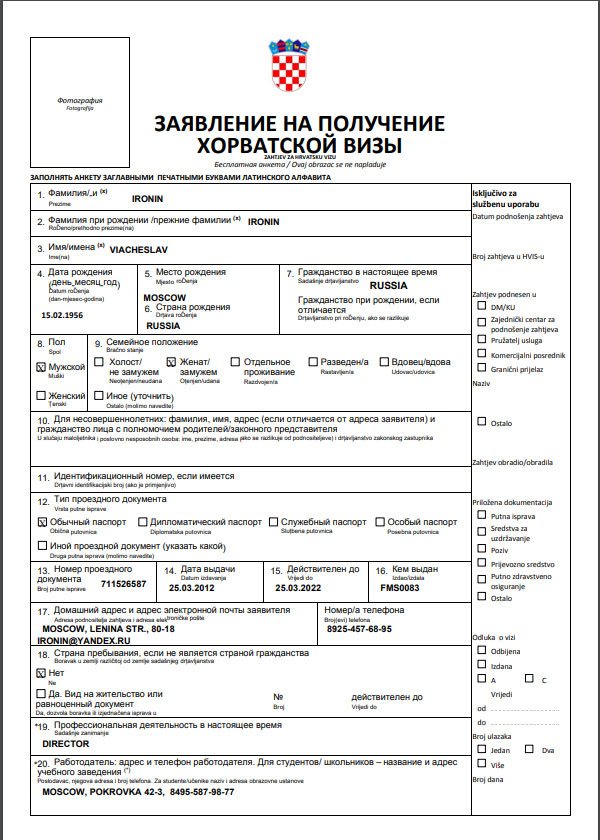
Sample of filling out an application form for a Croatian visa
A Schengen visa permit type C entitles a foreigner who has already entered Schengen territory to visit Croatia and remain within its borders without a national visa for the period of time remaining according to the validity period of the issued Schengen visa. To stay in Croatia longer, you will need to open a national visa or apply for a residence permit.
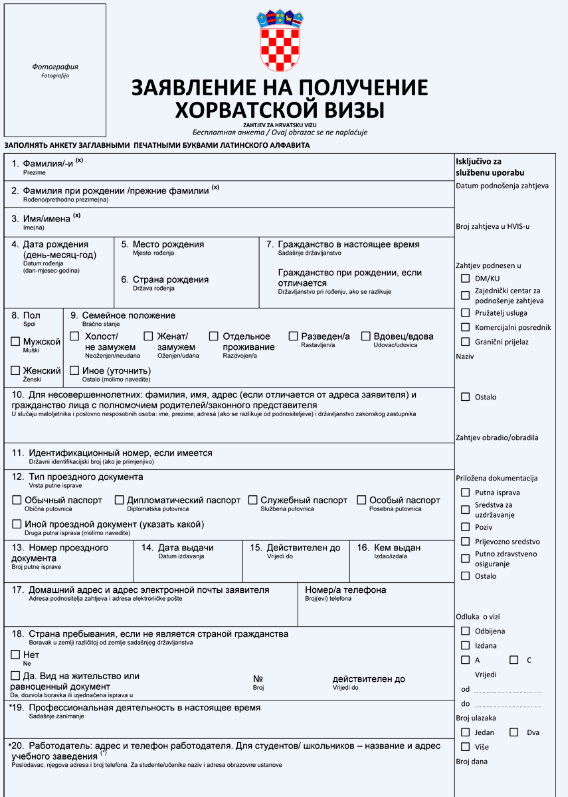
Croatian visa application form
Download: Croatian visa application form
To obtain a visa, the applicant should contact the Croatian consulate located in the country of permanent residence, or make an appointment at the visa center. The application date must be no later than three months before the planned visit to the Adriatic state.
To do this, you need to prepare a package of the following documents:
- an application filled out according to the sample;
- original and copy of a foreign passport, valid for at least 10 years. The passport must have at least two blank pages;
- two photographs of the established standard;
- a form that the applicant must fill out personally. The data is entered in Russian and Latin in accordance with the data in the international passport;
- if a foreigner has an invitation from a Croatian citizen, then this must also be brought. The document must be notarized;
- financial guarantees – a certificate that confirms the applicant’s sufficient level of income to stay in Croatia;
- written confirmation of official employment, if such a fact occurs;
- health insurance policy in the amount of more than 30 thousand euros.
The package of documents may differ depending on the purpose of the visit to the country. In addition, you will need to pay a state fee during the paper submission process. The fee is 35 euros. For the preferential group of citizens there is no need to pay a fee.
The category includes:
- children under 12 years of age;
- foreigners who have a relative of a Croatian citizen;
- government employees;
- citizens with a confirmed disability group who are incapacitated;
- judges of higher courts and others.
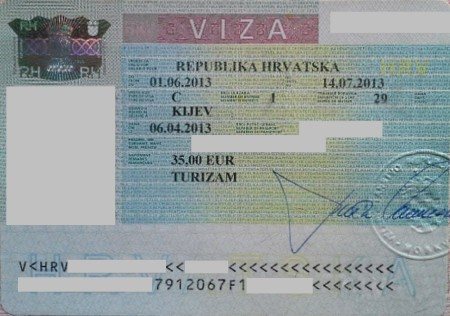
A detailed list of preferential categories can be found on the official portal of the Croatian Embassy in Russia. Processing of the application and the decision to issue a visa takes about five working days from the date of submission of the application.
If a foreigner is denied a visa, the fee is not refunded. After arriving in Croatia, a person can apply for a residence permit, thanks to which in the future he will be able to become a full-fledged citizen of this country.
How to obtain a residence permit, what methods exist, and what documents will be needed? Let's take a closer look.
What is the price
Of course, obtaining a residence permit cannot be called cheap. Considerable financial investments will be required. Depending on the reason for the trip, the amount may vary.
First you need to get a visa. A tourist ticket will cost 35 euros, and a national ticket will cost 60, but it’s better to apply for it anyway. The amount of expenses can also include payment for the Visa Center if the tourist plans to resort to its services.
The cost of obtaining a residence permit itself ranges from 500 to 2,500 euros.
To obtain a residence permit based on an existing business, you need to invest more than 200,000 kuna in it over three years, and registering a company will cost 4,000 euros.
Candidates for obtaining a residence permit
The following groups of foreigners can obtain a residence permit on Croatian territory:
- members of the same family. These may be spouses, children of a Croatian citizen, persons interested in reuniting their family;
- owners of a business that is registered within the Croatian Republic;
- Russian citizens who officially work in Croatia;
- foreigners who came to the republic to receive specialized education;
- foreigners seeking asylum in Croatia.
Today, there is economic and political instability in the world and in the EU countries, so the list of persons who can apply for a residence permit should be clarified at the embassy of the republic located in Russia.
Advantages and disadvantages
When considering options for countries to immigrate to European countries, few people consider Croatia.
But by choosing it, immigrants receive a number of advantages:
- Convenient location: Venice, Vienna, Munich, Budapest are nearby. Road trips throughout Europe are available.
- Transparent sea, clean beaches certified by the blue flag. This means their safety and environmental friendliness.
- Unique nature: lakes, waterfalls, forests, a large number of nature reserves.
- Medieval architecture.
- Security: stable and calm environment, low crime.
- High-quality free education for children, inexpensive medicine.
- The local language has many similarities with Russian and learning it will not be difficult for our compatriots.
- There is no property tax.
- Loyal attitude towards visitors from Russia, similar mentality.
- High-quality and inexpensive food products.
- For pensioners with a residence permit, it is possible to receive cash payments (pensions) corresponding to the European level.
Of course, there are also disadvantages to relocation, and each person has their own:
- It is difficult to find a job, there is a high degree of unemployment among the local population. In-demand job vacancies are filled by citizens arriving from European Union countries.
- Immigration rules are becoming stricter every year.
- The national currency is not the euro, but its own, the kuna.
- Each region has its own dialect.
- There is no centralized gas and water supply.
- Expensive winter heating.
If a person thinking about moving likes a calm and measured life, small cozy houses, Croatia will be an ideal option for this.
After all, the country prohibits the construction of buildings higher than three floors. After spending a certain amount of effort, time and money, it is possible to become a citizen of this Central European state.
